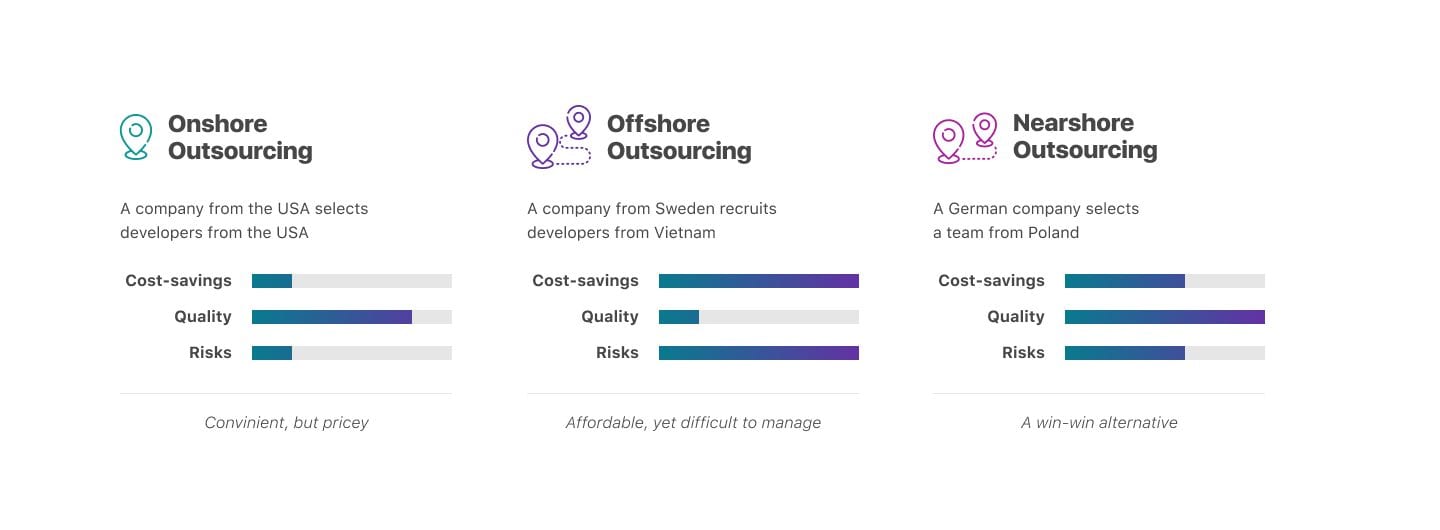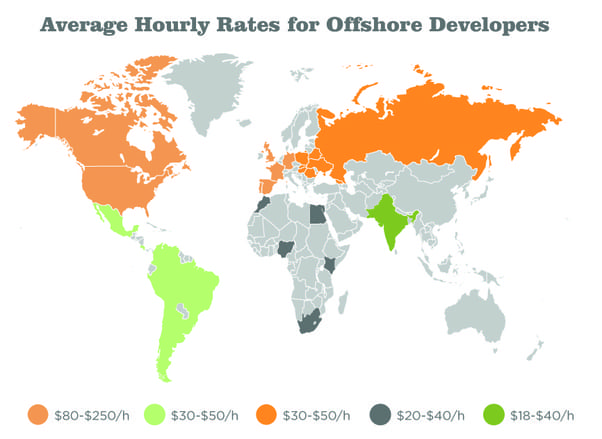Today, companies are trying to keep up with the rapid pace of tech innovation. Otherwise, they will be left behind, while their competitors will be reaping all the benefits of smart tech solutions.
However, while it’s easy to understand that your business needs to embrace digital changes, it’s a bit confusing when it comes to choosing the right developing consultancy. Onshore, offshore, even nearshore, the head is just going dizzy with all the terms.
Have no worries, as in this brief guide, we will shed light on the essentials of onshore software development. This article includes concise and comprehensive definitions, pros, and cons that will help you to arrive at an accurate conclusion.
What is Onshore Software Development?
Let’s take a look at the very word ‘ONshore’. It presupposes that one receives services from a company located on the same shore as your own business is. In other terms, if your company is located in the USA, and you turn to another company for help in the USA, it means you’ll turn to an onshore company.
Still, let’s avoid wishy-washy explanations, dive into a bit of detail. Onshore companies are registered in the country they originated in, and most importantly, the key employees as well as the founder physically live in the same country. Plus, their services are also mainly provided in the region their company is registered in. So, in case your business is located in the same area, you’ll be receiving services from an onshore consultancy.
When it comes to onshore software development, the idea is pretty the same. If you turn to local contractors or your internal development team to craft tech solutions within the region your business operates in - this will be onshore.
What is The Difference Between Onshore and Offshore Software Development?
As you’ve already got the grasp of onshore companies, let’s now see what the main differences are between offshore and onshore services. Needless to say that if ‘onshore’ development happens in the same country your business is located, one receives offshore services from a consultancy registered outside the country in which your business is located. In other words, while you work with local contractors with onshore consultancies, you work with teams or individual freelance workers outside your region when you turn to offshore companies.
So, the key differences between onshore and offshore companies include the physical location of the company’s staff and pricing rates. While the latter enjoy lower tax rates and better privacy, the former has no privileges when it comes to tax laws. This particular difference influences the higher rates of onshore software development in comparison with those of offshore.

Pros and Cons of Onshore Software Development Services
If you’re reading this article, you’re probably trying to make up your mind what type of services to choose: onshore or offshore. That is why we have singled out the pros and cons of the onshore developing process for you to get the bigger picture.
What are the main benefits of turning to onshore development consultancies?
- They are great for a complex project, as face-to-face communication and in-person collaboration make the developing process faster and more transparent, as there will be fewer communication delays and language misunderstandings.
- The more straightforward hiring process makes it easier to connect with the right team.
- There is no time overlap between the working hours of your team and the developers.
- There is apparent familiarity regarding the work culture.
- It is easy to keep your systems agile.
However, despite the appealing advantages, there are several drawbacks to the onshore developing process. The main ones include the following:
- The costs will be significantly higher in comparison with the rates for the same services you can get from offshore developers.
- The range of services is narrower, as offshore companies can afford to keep more developers and engineers.
- There is a smaller talent pool that limits the choices.
- Miscommunication due to corporate cultural factors may still be a problem.
What are The Costs of Working With Onshore Software Development Companies?
It’s easy to get carried away with convenient onshore developers you speak the same language with and don’t have to adjust your schedule due to enormous time zone differences. It’s appealing not to worry about unfamiliar laws and tax rules of another country. However, you’re probably waiting for ‘but.’ There is a ‘but’, and it is the cost of onshore development projects.
While offshore development consultancy hourly rates may start at $30 per hour, the onshore rates may start at $130 per hour. It’s four times more expensive than offshore services. So in case your business has a tight budget, onshore services can be quite pricey.

Conclusion: Which is The Better Option?
No dreadful email thread to accept one teeny-tiny amendment, sketching ideas on a whiteboard and coming up with creative solutions, communicating during the workday of both teams - this all paints a bit of a perfect working model that makes onshore development romantically appealing. However, when we face reality, it turns out there are still dreadful email threads, and sketching on a whiteboard doesn’t always result in groundbreaking ideas.
The thing is while we may be endlessly dwelling upon advantages and disadvantages of onshore and offshore services, the final answer to ‘Which is the better option in 2020?’ will definitely be offshore. Maybe, even a few years ago, one could have hesitated to take into consideration the time zone and communication difficulties into account. Though today, with the endless opportunities of communication channels, efficient offshore team management models, and the growing number of high-quality offshore development companies, the choice is obvious.
A list of attractive countries to turn to for offshore services
 Source: Kearney GSLI 2019
Source: Kearney GSLI 2019
Ironically, the majority of cons offshore services are known for has been disappearing due to tech advances. Convenient video conferences and virtual meetings are barely different from face-to-face communication. The language barrier is being blurred, as English has successfully confirmed itself as the ‘lingua franca’. Finally, cultural differences don’t have as much influence as before, as globally, people are becoming more and more alike, especially when it comes to their relations to tech innovations.
This leaves us with offshore pros overweighing its potential cons. You can find a freelance developer or turn to an offshore development team that will fit almost any project. What is more, the costs will be significantly lower without affecting the quality of the work.
As with any team, it is essential to build loyal and symbiotic relationships to bring the maximum value to the project you’ll be working on. The bad news is it’s a challenging task. Though, the good news is that searching offshore provides you with unlimited opportunities to find the team that will be just right to breathe life into your ideas.
We, at Intellectsoft, empower companies and their workforce with cutting-edge transformative solutions and data-driven insights. Are you and your organization ready to shift the mindsets and get the most out of innovations?
Talk to our experts and find out more about the topic and how your business or project can start benefiting from it today!